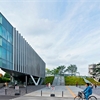How to choose a school and a region to study in Japan 3606
 Rieter University,The first batch of overseas study institutions certified by the Ministry of Education,Accredited by the world's top ICEF Education Exhibiting Organization (Screened Agency),Member of the National Overseas Study Agency Service Alliance (COSSA),Member of Beijing Overseas Study Service Industry Association (BOSSA),China Education Association for International Exchange self-funded study abroad intermediary service branch director unit,More than 10 years of experience in overseas study and immigration services,We have helped thousands of students achieve their dreams of studying abroad and finding jobs。
Rieter University,The first batch of overseas study institutions certified by the Ministry of Education,Accredited by the world's top ICEF Education Exhibiting Organization (Screened Agency),Member of the National Overseas Study Agency Service Alliance (COSSA),Member of Beijing Overseas Study Service Industry Association (BOSSA),China Education Association for International Exchange self-funded study abroad intermediary service branch director unit,More than 10 years of experience in overseas study and immigration services,We have helped thousands of students achieve their dreams of studying abroad and finding jobs。
If you have any questions about studying abroad and working abroad, please call us 022-2328-9071/9075
When applying for a master's degree in Japan, a school in a certain area has relatives, classmates, friends who want to be taken care of, whether it is convenient to work, whether the city is prosperous, or even select a place or school for reasons such as climate。This is obviously influenced by applying to language schools。There are many language schools in Japan, several in each city, and it is hoped that the more applicants, the better, if you do not consider the rejection rate, the applicant can choose a regional school。It should be noted that people who have lived and studied in Japan know that the care of relatives, classmates and friends is very limited;Employment depends more on language than region;Japan's national universities are located in the prefectural (provincial) city, except for a few megacities, the other prefectural (provincial) city is not very different。Not to mention, if you choose districts and schools for these reasons, it will greatly reduce the success rate of applications。Here's why:
1, Japan has a total of 86 national universities, excluding professional universities, the vast majority of places (prefectures) only one national university, if you choose a region, in most cases actually means that you can only apply for one university。In addition, some universities have strict restrictions on the recruitment of postgraduate students, such as only accepting government-funded international students, or students from universities with which they have academic exchange agreements or student exchange agreements。
2. The admission of graduate students in most Japanese universities is based on the decision of the supervising professor。The most basic prerequisite for a professor to accept an applicant is that the subject of his or her research must be consistent with that of the professor。There are only a limited number of tutors working on the same subject in any country, and even fewer at the same university。In addition, even if the supervisor's research topic is successfully studied, the number of graduate students accepted by the supervisor is limited, generally only one or two people, the quota is full in many cases, and the supervisor can not accept graduate students abroad to give lectures。These factors determine the way to contact the tutor - one cannot contact the other, that is to say, only to contact the tutor by professional topics, so as to determine the school, determine the region, not the opposite, not to determine other factors, otherwise the application is slim。
3. Many universities have special requirements for applicants' qualifications,Some universities must provide Japanese study examination results if required,Because the exam is not held in China,Domestic students cannot apply to schools with such requirements;Some require Japanese Language Proficiency test scores or TOEFL scores,Applicants without these grades cannot apply to schools that require them;Some majors require you to have studied the major in college,If you do not have these qualifications instead of choosing a certain district, a certain school,There's no way that's going to work。
4, Whether the professor accepts the applicant's factors are mainly: (1) the basic conditions of the applicant, such as educational background and language level;(2) Basic academic competence: knowledge level and research ability;③ Cultivation potential。The latter two items are mainly judged by the performance table, research performance, papers, works and the determination of the research topic, and the writing of the research plan。In addition, it also depends on the grade of the graduating school, under normal circumstances, the grade of the graduating school should be comparable to the grade of the school applied for, if too much difference will affect the application。
5. It is more important to self-evaluate your own strength and have a clear grasp of your purpose of studying abroad。If you just want to experience the graduate school life in Japan,With the idea of getting a degree if possible,He is not interested in learning,They also feel that they do not have much ability to study and do research,It is better to apply to the school that suits your actual situation,Otherwise, even if the application is successful,Going to the future will increase their burden,Can't even reach their own minimum goal。Because the more first-class the university, the higher the requirements for students。If you do not have the level, first of all affect the supervisor's opinion of you, you may not be admitted to the graduate school from the postgraduate;Secondly, even if you get in, your life will be difficult, you may not be able to keep up with the course, can not do experiments, can not write research reports, graduation papers, and then affect the daily life。
In short, there is a two-way choice between applicants and universities, applicants choose the school, the school also chooses the student, the final admission is the key in the tutor, in the school's regulations, in their own conditions, rather than one's own willingness。The mood of choosing the ideal school is understandable, but we must follow the rules of applying for postgraduate study in Japan, bearing in mind that we are going to do research, and we should determine the tutor, determine the school, and determine the region based on the title of our professional courses and our own conditions。In addition, after graduating from graduate school, you can freely choose the region where you work, which is a more fixed place of residence, so you should choose the school according to the subject, and then choose the region when you work, so that you can realize your dream of going to Japan for graduate school and successfully achieve your goal in the future














